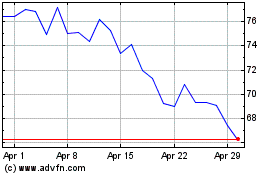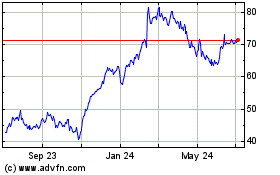By Preetika Rana and James Rundle
Uber Technologies Inc. sued the Los Angeles Department of
Transportation on Tuesday, escalating a monthslong disagreement
over the city's data-collection efforts.
Uber has been sparring with the city's transportation authority
over a rule that requires that it share real-time location data for
its dockless scooters.
City officials have said they need this data to better manage
traffic on public streets and reduce safety hazards caused by
abandoned scooters and bikes. The information they collect is
treated as classified, they say, and stripped of personally
identifying information. A spokeswoman for the agency declined to
comment on the lawsuit, saying "it is not business as usual for the
city" as it wrestles with the coronavirus pandemic. She said Uber
recently began complying with the rules that it was
challenging.
Earlier this month, Uber began sharing real-time location data
with Los Angeles to avoid pulling its Jump scooters from the city.
Previously, it shared data with a 24-hour lag.
But the company argues that the collection of real-time data
could give governments a precise window into the daily lives of its
residents, even if the information is scrubbed of names and other
directly identifiable information.
Uber says the information could be used by government
agencies--or breached by malicious hackers--to target specific
groups or communities, stalk individuals or commit fraud.
A legal battle could set the stage for how cities strike a
balance in policing the companies that use their streets while
safeguarding people's privacy.
Uber alleges that the city's real-time data sharing requirement
violates state and federal law, including the Fourth Amendment of
the U.S. Constitution, according to the lawsuit filed in federal
court in Los Angeles. The Fourth Amendment protects citizens from
unlawful search and seizure of private property.
Uber asks in the suit that the Transportation Department pay
attorney fees and other costs associated with the trial. It also
asked "for any other relief that the court deems just and
proper."
Other U.S. cities are closely watching what happens in Los
Angeles. Many use the same software--developed by the city's
Transportation Department in 2018--to track mobility providers on
their streets.
"When you're talking about real-time data location sharing,
you're essentially talking about surveillance," Uber's chief
privacy officer, Ruby Zefo, said in an interview earlier this year.
Los Angeles hasn't told the company what it plans to do with the
data, who it plans to share it with or how it plans to safeguard
it, she said.
"We'd be willing to participate to standardize these things,"
Ms. Zefo said, but right now "there is no standardized way of doing
it."
Rival Lyft Inc. shares real-time scooter data with Los Angeles,
but a spokesman said the company has expressed "continued concerns
about the privacy risks of collecting" it. In a letter addressed to
the city's transportation agency last year, and reviewed by The
Wall Street Journal, Lyft said underserved individuals are more
likely to hail bikes and scooters than private taxis. They are also
more likely to have run-ins with law, the company said, raising
questions about whether real-time location sharing "could become a
surveillance tool for law enforcement."
Worries that government agencies could use big data to spy on
people aren't without precedent. The Journal reported last month
that the Department of Homeland Security bought access to a
commercial database that maps the movements of millions of
cellphones in America and uses it to track people suspected of
entering the U.S. unlawfully.
The location data was drawn from ordinary cellphone apps,
including those for games, weather and e-commerce, for which the
user had granted permission to log the phone's location.
Dockless scooters are relatively low-tech devices that are
vulnerable to attack, according to researchers. Last month,
researchers from security company Imperva Inc. said they were able
to reverse-engineer connections between scooters and company
servers to track the location of individual vehicles in Tel
Aviv.
Murtuza Jadliwala, an assistant professor at the University of
Texas at San Antonio, published a paper earlier this year outlining
how a hacker could break into location systems, steal payment
details and even launch physical attacks by compromising the
Bluetooth connection between a rider's smartphone and the
vehicle.
Such information is sensitive, but Mr. Jadliwala said that
mobility providers already collect it. "I think from that aspect,
the thing that we need to worry more about is how are the service
providers using that? Because they are the ones that have hordes of
passenger or rider data," he said.
Uber's Ms. Zefo says the company collects "location data to
manage our assets. We're not out to do anything more than that."
The private sector has "all kinds of legal requirements" that don't
apply to governments, she said.
City officials believe that Uber's primary concern isn't user
privacy. They say the company is using the argument to circumvent
regulation and resist sharing information about its operations.
"That fear of data collection as the slippery slope towards full
government regulation is very much in the DNA of these companies,"
Seleta Reynolds, general manager of the Los Angeles Department of
Transportation, said in a recent interview. "It's because of the
history of how they launched and grew up."
Uber has come under scrutiny over user privacy. In 2017, it
settled accusations from the Federal Trade Commission that it
failed to properly monitor use of a program called "God view" that
allowed staff to view user trips in real time. Another software,
"Greyball," was designed to identify law-enforcement officials and
competitors attempting to disrupt operations.
"That's not the company we are now," Ms. Zefo said. Uber hired
Ms. Zefo in 2018 as its first chief privacy officer.
Write to Preetika Rana at preetika.rana@wsj.com and James Rundle
at james.rundle@wsj.com
(END) Dow Jones Newswires
March 25, 2020 01:06 ET (05:06 GMT)
Copyright (c) 2020 Dow Jones & Company, Inc.
Uber Technologies (NYSE:UBER)
Historical Stock Chart
From Mar 2024 to Apr 2024

Uber Technologies (NYSE:UBER)
Historical Stock Chart
From Apr 2023 to Apr 2024
